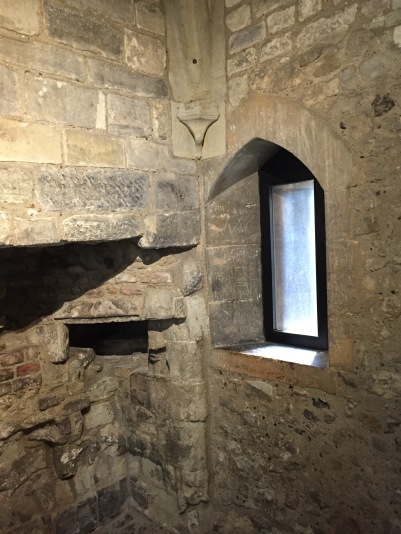
Diving into the minutiae of history. Some call it research while others, procrastination. I prefer to think of it as inspiration.
History is my source for inspiration, and it tends to be the small things that attract my attention. The information you can find in footnotes can be veritable gold. There’s the main historical account and then there are these nuggets of information that don’t quite fit in with the narrative, but were fascinating for the historian nonetheless. It’s like a impromptu “by the way did you know” anecdote; an invitation to explore the rabbit warren. The gaps in history and the ‘what if’s’ send my muse off like Nancy Drew.
Allow me to share with you an interesting skeleton of a story that I uncovered in a footnote of history. I was researching gaols one day and idly trolling through British History Online (aka Historical Fiction Procrastinators Anonymous)…wait, why gaols you ask? When your main character is a highwayman, you become very fascinated with them. No spoilers, but they tend to be an occupational hazard. Clears throat and continues.
So there I was flipping through references to Warwickshire gaols, and I come across an entry in the Calendar of State Papers. The Calendar of State Papers was a record of the government’s business, motions and decisions, and not a court of law. This particular entry was made on September 12, 1650 (British History Online).
“To write Col. Purefoy to examine the charge against Major Burgoine of Coventry, upon the articles enclosed to him.”
“40s. To be paid to James Grayle, who came from Coventry to inform Council of the disturbances there by Major Burgoine, about proclaiming the King of Scots King of England.”
To give a bit of background, the King of Scots is a reference to Charles Stuart, later Charles II. In 1650, he was an exile trying to reclaim his late father’s English throne. King Charles I had been executed a year and a half earlier by his Parliamentarian enemies, and the twenty year old Charles Stuart had made a bargain with Scotland, two months prior to this entry, to help him get his crown back. The closest that the Parliamentarians came to acknowledging his kingship was as the Scottish King, which was ironic because Charles was more English than Scottish.
But this wasn’t what actually intrigued me. Who was Major Burgoine and why would this James Grayle make the troublesome journey from Warwickshire to London to sell the man out? Clearly, Grayle had initiated this trip. He hadn’t been summoned to Whitehall to chat about the state of Coventry.
So why did James Grayle, Informant, feel that this was the juiciest piece of information and hightailed it to London to share with the merry men at Whitehall? They were grateful for the news, judging by the compensation they awarded Grayle for his troubles. 40s represented roughly a month’s wages for a labourer.
I had to dig into this further. The hunt was on.
The next entry regarding the matter of Major Burgoine was on October 9, 1650 in the Calendar of State Papers (British History Online) and there was a neat little twist:
“To write the Militia Commissioners for Coventry that Council is much dissatisfied with Burgoyne’s escape, and particularly as the gaoler who suffered him to escape is not proceeded against; and to desire them to re-examine the business and the informer, and commit the gaoler, until he gives good bail to appear at the next assizes for trial, and to bind over the prosecutor and witnesses to appear and prosecute, and to return an account to Council.”
Within a space of a month, our Major Burgoine/Burgoyne (creative spelling was a thing then) had been arrested, locked up in Coventry gaol and then engineered an escape! Even better, the gaoler had been implicated as his accomplice. Now, this would not really have been a shocker of a revelation at that time. Gaolers were usually local men who were paid a very nominal fee by the town to guard the prisoners. The majority of their pay would have come from the prisoners themselves. The more well off the prisoner, the better the lodgings. Those who couldn’t afford to pay were at the mercy of the parish and were kept in the worst lodgings, the ‘two penny’ ward. Many gaolers were not above a bit of free trade and were willing to consider a better offer. But in this situation, there was a further twist: the authorities in Coventry had not bothered to arrest the gaoler for his dereliction. Did they feel sorry for the man, having to support a wife and (possibly) multiple children, or instead, were their sympathies with the prisoner?

Who was Major Burgoine? If he had proclaimed Charles the King of England, surely he had been a Royalist?
I caught up with Major Burgoine in a House of Lords Journal dated February 4, 1643 (British History Online), the first winter of the civil war. The record listed the Parliamentarian business for their war effort. For the raising of troops for Parliament, our major (then a sergeant major) was given this commission for the “city and county” of Coventry in Warwickshire. Our man was a Parliamentarian!
The next reference to the major was another House of Lords Journal dated May 26, 1645 (British History Online) when he was offered the governorship of Coventry. He had responded to their promotion with a letter dated May 16th addressed to the Speaker of the House of Commons:
“Honourable Sir,
“I cannot but take Notice of a Report of my being appointed Governor of Coventry by both the Honourable Houses. In the First Place, to return my most humble Thanks for so high an Honour conferred upon me, whereby I am ever obliged to lay out myself, as hitherto I have done my best Endeavours, so hereafter in my heartiest Prayers for your Honours, and your good Successes in all your pious Counsels and Undertakings; for that I must needs become an humble Suitor to your Honours (as with much Favour you have conferred this Place upon me), so you will please to take into Consideration my ingenuous Acknowledgement of mine utter Insufficiency to undergo so great a Burthen and Charge, by reason of mine Age, and the Infirmities that of late have beyond Expectation extraordinarily accompanied it; which, though it no Whit lessens the Vigour of my Will and Affections to the Cause and your Service, yet I must needs acknowledge my Disability of Body to be such, as that I am not only minded to beg Leave to resign this Employment newly conferred upon me; but am inforced, by the sensible Increase of my bodily Dispositions, to take my Ease, and very shortly to bid Farewell to all the Activity of Soldiery, though with my best Advice I shall still continue to serve the State, jointly with the rest of the Committee, for the Preservation of this Town and County, according to the Trust reposed in me; which is all I humbly pray may be expected from me, or imposed upon me; for which Favour I shall be yet further obliged to remain,
“Your Honour’s humble and ever devoted Servant,
Covent. May 16th, 1645.
“Peter Burgoyne.”
This would have been near the end of the first civil war and things were not going well for Parliament (though that would reverse a few weeks later at Naseby, which was a huge victory for Parliament and a major kick in the teeth for the king). After years of fighting was our major ill and shattered? It’s not unreasonable to suppose he was. They even offered up prayers for the man.
Perhaps the answer lies in the next record I found was under the December 2, 1648 Acts and Ordinances (British History Online). Peter Burgoine was once again listed as one of the commissioners for raising the militia in his county, though without a rank. Presumably, his health improved, or in their need, Parliament didn’t care and forced him to break his retirement. For you see, they were facing a crisis. King Charles I had been captured in 1648 and his negotiation for terms caused a divide in Parliament.
The moderates favoured a negotiated treaty with their monarch so everyone could make up and play nice again. The king would get his crown back, albeit with curtailed powers. On the other side, the New Model Army grandees were opposed to treating with the king; they simply did not trust his word, which was fair as he had no intention of honouring any agreement that would restrict his kingship. The General Council of the army lobbied to end the negotiations and put the king on trial. Naturally, the moderates were horrified and rejected their demands. What they forgot was that he who controls the army, wins.

The army marched on London and occupied it on December 2nd, the day that Parliament was naming commissioners to raise troops. Four days later, Colonel Pride of the New Model Army stormed into a sitting session of Parliament and arrested all the moderate Members of Parliament, an act known as Pride’s Purge. A month later, Parliament (or those who were left) voted themselves supreme authority without having to answer to the King or to the House of Lords. Their first action was to order the King’s Trial. He was found guilty on January 27, 1649 and beheaded two days later.
Where did that leave Major Peter Burgoine? Sometime over the next six to eight months, he must have suffered a change in conscience in order to switch sides. Was it the execution of the king that tipped it for him or was it the high handed way that the army seized control? Many of the Parliamentarians had, after all, fought the king to force a constitutional monarchy. Pride’s Purge was essentially a military coup. Whatever his reasons, Peter Burgoine had enough. His anti-government activities clearly shocked the Council. If Parliament could lose such a faithful and highly respected servant to their cause, this did not bode well for them. No wonder James Grayle rushed to London to tip them off.
What happened to Peter Burgoine? There is no further mention of him. Very likely he made good on his escape, otherwise, there may have been a followup entry that the prisoner had been caught. Did he leave England and join Charles II in The Hague as many exiles did, or did his age and ill health finally catch up to him?
We’ll never know. Therein lies the gold.
For another story that I stumbled on while procrastinating researching in British History Online, check out Puzzles in the Historical Record: The Highwayman Did it?
Fascinating story! I definitely pick up on your intrigue. Can’t wait to the fiction that this major wiggles his way into.
LikeLiked by 1 person
I do in fact leverage this 🙂
LikeLiked by 1 person
Very cool:) I sometimes find that because truth is stranger than fiction, an author almost has to bend the truth just to make it “believable” to readers:)
LikeLiked by 1 person
So true! Coincidences are common in real life but the writer who works one in gets raked across the coals.
LikeLike
[…] One of the things I love most about history is the stories of people who lived in the past, particularly those who don’t have a historical event attached to their names. We find them in diaries, in footnotes, and in anecdotes. I often wonder what they must think if they were suddenly transported to the present and shown proof that their name and their story has been somehow preserved hundreds of years later. I’m reminded of the young man who went courting but ended up embroiled in a skirmish (“Young” Cambusnethen), or the mayor of a small Midlands town who caused consternation when he switched sides (Major Peter Burgoine). […]
LikeLike